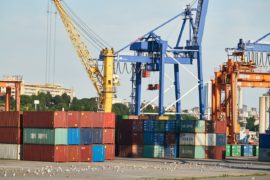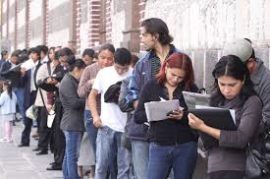- Fecha(s): 26/04/2023
- Lugar: Sala de seminarios de Economía aplicada (Facultad de Economía y Empresa) - Universidad de Murcia
- Ponente: Víctor Luque de Haro (Universidad de Almería)

Resumen A lo largo del siglo XIX se produjo en el ´ámbito europeo un considerable aumento de las migraciones exteriores e interiores. Tradicionalmente la historiografía ha considerado que en España los movimientos migratorios permanentes, tanto internos como externos, durante la mayor parte del siglo XIX fueron relativamente débiles en comparación con las de otros países…
- Fecha(s): 19/04/2023
- Lugar: Sala de seminarios de Economía aplicada (Facultad de Economía y Empresa) - Universidad de Murcia
- Ponente: Parinya Nakpathom (University of Burapha)

Abstract This study seeks to explore the main factors influencing Thai female consumers purchasing behavior and identify the relationship between consumer behavior and sales objectives of Korean Cosmetic brands I. The data was collected in the form of an online questionnaire which was divided into 5 subsections. This was followed by 1) Demographic data 2)…
- Fecha(s): 16/03/2023
- Lugar: Sala de seminarios de Economía aplicada (Facultad de Economía y Empresa) - Universidad de Murcia
- Ponente: José Manuel Rueda Cantuche

The increase in the fragmentation of production across countries and the subsequent growth in the trade of intermediate products have raised concerns about the suitability of conventional trade statistics to understand the economic consequences of trade. Several authors have attempted to disentangle value added content of trade. This technical report proposes a novel framework that…
- Fecha(s): 18/01/2023
- Lugar: Sala Seminarios CIO (UMH). Se grabará.
- Ponente: Alejandro Saavedra-Nieves, Departamento de Estadística, Análisis Matemático y Optimización, Universidad de Santiago de Compostela

El cómputo exacto de soluciones de juegos cooperativos presenta una alta complejidad computacional cuando el número de jugadores involucrados es lo suficientemente grande. En este sentido, las metodologías de muestreo se presentan como alternativa para su aproximación en general. En esta charla revisaremos algunas de las propuestas en la literatura basadas en muestreo, así como…
- Fecha(s): 15/12/2022
- Lugar: Sala de seminarios de Economía aplicada (Facultad de Economía y Empresa) - Universidad de Murcia
- Ponente: Manuel Pérez García (Shanghai Jiao Tong University)

Abstract Within the framework of the current global crisis provoked by the COVID-19 pandemic and the hegemonic role of China in the world economy, the revision of China’s socioeconomic and political transformation from imperial Qing dynasty until the present day is paramount. This presentation focuses on a crucial period in the history of China, the…
- Fecha(s): 01/12/2022
- Lugar: Seminario de Métodos Cuantitativos. Facultad de Economía y Empresa. Universidad de Murcia
- Ponente: Germán López Buenache (Universidad de Murcia)

Most economic applications rely on a large number of time series, which typically have a remarkable clustering structure and they are available over different spans. To handle these databases, we combined the expectation–maximization (EM) algorithm outlined by Stock and Watson (JBES, 2002) and the estimation algorithm for large factor models with an unknown number of…
- Fecha(s): 24/11/2022
- Lugar: Online (el enlace se proporcionará a través del Aula Virtual)
- Ponente: Lisard Palau Elcacho (Universidad de Barcelona)

Cuando hablamos de las colonias industriales textiles nos estamos refiriendo, seguramente, a uno de los fenómenos más característicos de la industrialización de Catalunya. Surgidas mayormente a partir de los años setenta del siglo XIX, tendieron a ubicarse a lo largo de los cursos fluviales de los ríos Llobregat, Ter y afluentes para utilizar el agua…
- Fecha(s): 17/11/2022
- Lugar: Seminario de Métodos Cuantitativos. Facultad de Economía y Empresa. Universidad de Murcia
- Ponente: Ismael Gálvez Iniesta (Universidad de las Islas Baleares)

We assess the unequal effects of the Great Recession on the labor market outcomes of different cohorts of young individuals and education groups in Spain. We provide empirical evidence that young workers in Spain suffer from a high unemployment rate because of a low job-finding rate and a high separation rate. We also document that…
- Fecha(s): 06/10/2022
- Lugar: Salón de Grados de la Facultad de Economía y Empresa de la Universidad de Murcia
- Ponente: Paul De Grauwe

El eminente economista Paul De Grauwe, en la víspera del día de la ceremonia en la que tendrá lugar su investidura como Doctor Honoris Causa de la Universidad de Murcia, impartirá un seminario/conferencia dirigido a los estudiantes del programa de doctorado DEcIDE y, en general, a todos los estudiantes y profesores de la Facultad de…
- Fecha(s): 04/10/2022
- Lugar: Instituto Centro de Investigación Operativa (Universidad Miguel Hernández). Se grabará.
- Ponente: Marc Escrihuela, Universidad de las Islas Baleares (UIB)

In many economically relevant situations, the outcome of a negotiation determines not only how the two parties share the surplus generated by their interaction (share effect), but also the aggregate surplus (size effect). We show that, in multilateral negotiations modeled using the Nash-in-Nash solution, the equilibrium payoff of a party may be decreasing in her…











